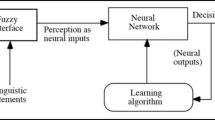Abstract
In this work, we applied Adaptive Neuro-Fuzzy Inference System to three different classification problems: (1) sentence-level subjectivity detection, (2) sentiment analysis of texts, and (3) detecting user intention in natural language call routing system. We used English dataset for the first and second problems, but Azerbaijani dataset for the third problem based on same features. Our feature extraction algorithm calculates a feature vector based on the statistical occurrences of words in a corpus without any lexical knowledge.
Access this chapter
Tax calculation will be finalised at checkout
Purchases are for personal use only
Similar content being viewed by others
References
B. Pang, L. Lee, S. Vaithyanathan, Thumbs up? Sentiment classification using machine learning techniques, in Proceedings of CoRR (2002)
R. Prabowo, M. Thelwall, Sentiment analysis: a combined approach. J. Info. 3(2), 143–157 (2009)
Y. He, Bayesian models for sentence-level subjectivity detection, in Technical Report KMI-10-02, June 2010 (2010)
S.S. Rustamov, E.E. Mustafayev. M.A. Clements, Sentiment analysis using neuro-fuzzy and hidden Markov models of text, in IEEE Southeast Conference 2013 (Jacksonville, USA, 2013) (in press)
S.S. Rustamov, M.A. Clements, Sentence-level subjectivity detection using neuro-fuzzy and hidden Markov models, in Proceedings of the 4th Workshop on Computational Approaches to Subjectivity, Sentiment and Social Media Analysis in NAACL-HLT 2013 (Atlanta, USA, 2013) pp. 108–114
S.S. Rustamov, E.E. Mustafayev, M.A. Clements, An application of hidden Markov models in subjectivity analysis, in IEEE 7th International Conference on Application of Information and Communication Technologies AICT2013 (Baku, Azerbaijan, 2013), pp. 64–67
S.S. Rustamov, An application of neuro-fuzzy model for text and speech understanding systems/PCI’2012, in The IV International Conference “Problems of Cybernetics and Informatics”, vol. I (Baku, Azerbaijan, 2012), pp. 213–217
S.S. Rustamov, On an understanding system that supports human-computer dialogue/PCI’2012, in The IV International Conference “Problems of Cybernetics and Informatics”, vol. I (Baku, Azerbaijan, 2012), pp. 217–221
J. Chu-Carroll, B. Carpenter, Vector-based natural language call routing. Comput. Linguist. 25(3), 361–388 (1999)
F. Doshi, N. Roy, Efficient model learning for dialogue management, in Proceedings of the ACM/IEEE international conference on Human-Robot Interaction (HRI’07) (2007) pp. 65–72
I. Zitouni, H.-K.J. Kuo, C.-H. Lee, Combination of boosting and discriminative training for natural language call steering systems, in Proceedings of the International Conference on Acoustics, Speech and Signal Processing (Orlando, USA, 2002)
K.R. Aida-zade, S.S. Rustamov, E.A. Ismayilov, N.T. Aliyeva, Using fuzzy set theory for understanding user’s intention in human-computer dialogue systems, in Translation of ANAS, Series of Physical-Mathematical and Technical Sciences, vol. XXXI, no. 6 (Baku, 2011), pp. 80–90 (in Azerbaijani)
K.R. Aida-zade, S.S. Rustamov, E.E. Mustafayev, N.T. Aliyeva, Human-computer dialogue understanding hybrid system, in International Symposium on Innovations in Intelligent Systems and Applications (INISTA 2012) (Trabzon, Turkey, 2012)
R. Fuller, Neural Fuzzy Syst. (1995)
J. Martineau, T. Finin, Delta TFIDF: An improved feature space for sentiment analysis, in Proceedings of the 3rd AAAI International Conference on Weblogs and Social Media (2009)
B. Pang, L. Lee, A sentimental education: Sentiment analysis using subjectivity summarization based on minimum cuts. In Proceedings of the 42nd Annual Meeting on Association for Computational Linguistics (ACL) (2004), pp. 271–278
Acknowledgements
This work was supported by 5th Mobility Grant of the Science Development Foundation under the President of the Republic of Azerbaijan.
Author information
Authors and Affiliations
Corresponding author
Editor information
Editors and Affiliations
Rights and permissions
Copyright information
© 2018 Springer International Publishing AG, part of Springer Nature
About this chapter
Cite this chapter
Kamil, Az., Rustamov, S., Clements, M.A., Mustafayev, E. (2018). Adaptive Neuro-Fuzzy Inference System for Classification of Texts. In: Zadeh, L., Yager, R., Shahbazova, S., Reformat, M., Kreinovich, V. (eds) Recent Developments and the New Direction in Soft-Computing Foundations and Applications. Studies in Fuzziness and Soft Computing, vol 361. Springer, Cham. https://doi.org/10.1007/978-3-319-75408-6_6
Download citation
DOI: https://doi.org/10.1007/978-3-319-75408-6_6
Published:
Publisher Name: Springer, Cham
Print ISBN: 978-3-319-75407-9
Online ISBN: 978-3-319-75408-6
eBook Packages: EngineeringEngineering (R0)




